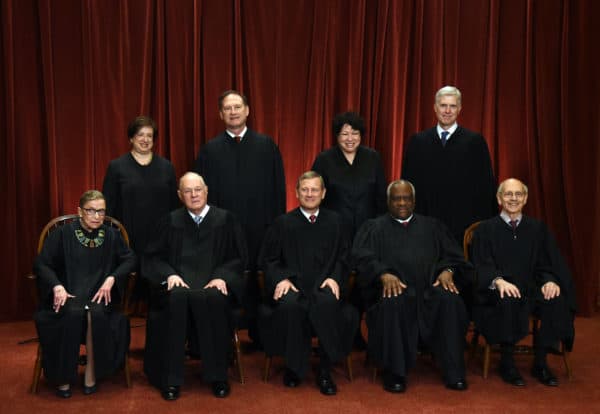Supreme Court Allows Broad Enforcement of Travel Ban — at Least for a Day
Matt Zapotosky, Washington Post, September 11, 2017

Credit Image: © Olivier Douliery/CNP via ZUMA Wire
U.S. officials can at least temporarily continue to block refugees with formal assurances from resettlement agencies from entering the United States after the Supreme Court intervened again Monday to save a piece of President Trump’s travel ban.
Responding to an emergency request from the Justice Department, Justice Anthony M. Kennedy stopped an earlier federal appeals court ruling that had allowed refugees with a formal assurance to enter the country.
Kennedy, who handles cases on an emergency basis from the U.S. Court of Appeals for the 9th Circuit, ordered those suing over the ban to respond by noon Tuesday.
{snip}
The Supreme Court’s decision came not long after the Justice Department asked the justices to act.
{snip}
Since Trump signed his first travel ban shortly after taking office, the directive has been mired in a complicated legal battle.
{snip}
The Supreme Court ultimately decided Trump could impose that measure, but not on those with a “bona fide” connection to the United States, such as having family members here, a job or a place in a U.S. university.
It is the interpretation of a “bona fide” connection to the United States that is being debated. The government initially sought to block grandparents and other extended family members of people in the United States from entering as well as refugees with formal assurances — though a federal district judge stopped from doing so. The Supreme Court in July largely upheld that ruling, though it put on hold the portion dealing with refugees.
Last week, a federal appeals court panel weighed in, deciding that the administration could block neither grandparents nor refugees with assurances.
The Justice Department asked the Supreme Court to step in again — though only to block refugees, not grandparents and other extended family members.
{snip}
Neal Katyal, a lawyer representing the state of Hawaii, which is challenging the travel ban, wrote on Twitter that he would “fight” the government’s latest request.
{snip}
Time is beginning to become a factor in the broader fight over Trump’s travel ban.
The measure was supposed to have been temporary — lasting 90 days for citizens of the six affected countries, and 120 days for refugees. If the measure is considered to have taken effect when the Supreme Court allowed a partial ban, the 90 days will have passed by the time the justices hear arguments Oct. 10, and the 120 days are very likely to have passed by the time they issue a decision.
{snip}
A State Department spokeswoman said Monday that the department was “engaging with foreign governments to meet these new standards for information sharing” but could not “prejudge the outcome of this engagement.”
“We recognize that many governments will need time to meet any new standards
{snip}















